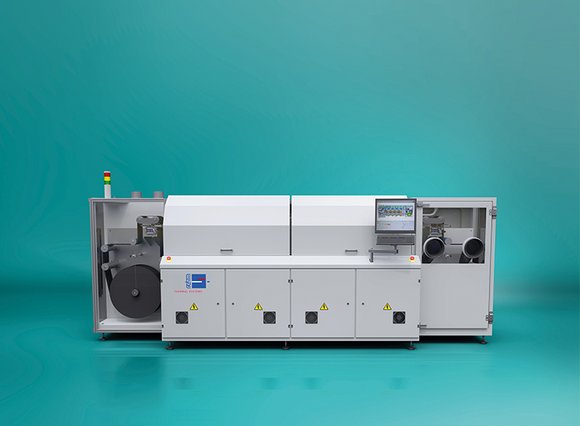Rehm has many years of experience with drying processes for various industrial applications. This also includes film drying. Drying the electrodes is an important step in the production process for manufacturing lithium-ion batteries. The drying process withdraws the solvent from the electrode coating on the film. These thermal drying solutions enable a very high degree of purity to be achieved for the drying. With its reel-to-reel drying system RDS battery, Rehm provides a concept that can be used to achieve the drying temperature via infrared radiation, convection, or a combination of both heat-transfer mechanisms. The system is primarily designed for research facilities.
Thanks to the freedom to choose between infrared radiation and convection, the reel-to-reel dryer provides great flexibility in handling various electrode formulas. The transport via the inline system takes place from roll to roll, meaning that the film hovers in the drying area during the process, which allows it to be dried on both sides. This means that the drying parameters can be selected flexibly and the heat can be adjusted individually from below and above. This is achieved either by setting the temperature or by adjusting the distance of the IR beam sources, which enables the performance profile to be varied. Solvents are efficiently removed from the dry zone and moved into an exhaust gas management system, meaning that no harmful substances reach the outgoing air.
More thermal system solutions by Rehm
Since, in electric vehicles, both the power electronics and the battery are subjected to challenging environmental conditions, such as vibration, dust, extreme temperature differences and moisture, the use of protective coatings is more important than ever in this field. With conformal coating, the areas that require protection are selectively and automatically coated with a protective lacquer. This counteracts short circuits that arise, for example, as a result of condensation, thus extending the service life of the products and guaranteeing the functionality of sensitive electronic components even in critical situations. The system is also available as a line concept including a lacquer dryer and can therefore be integrated flexibly and efficiently into existing production operations. With the ProtectoXP and ProtectoXC, Rehm offers systems that provide solutions for conformal coating in the installation of the battery system and for the power electronics.
Furthermore, the Rehm Thermal Systems product portfolio offers additional solutions for the field of power electronics. There is a strong focus on thermal management for the components required for this in order to prevent overheating and any premature failure that may occur as a result of this, even with the heat loss created by the high level of performance. Voids (pores in the soldered joints), in particular, may lead to hot spots. The vacuum option in the soldering process for Rehm systems is increasingly being used here to prevent the negative effects of pore formation. The vacuum option is available with the Vision series convection soldering systems, the Condenso series condensation soldering systems, and the Nexus contact soldering system.
ARTEMYS research project
As part of the ARTEMYS research project funded by the Federal Ministry of Education and Research (BMBF), Rehm is working on a cooperative project regarding the development of the next generation of lithium-ion batteries, known as solid-state batteries, with various research institutes and industry partners, including BASF SE and the BMW Group. Solid-state batteries are characterised by all the components being solid bodies: There are no liquids in the cell. Scientists expect these batteries to be able to provide higher specific energy densities and improved safety properties. In the ARTEMYS project, suitable process technology is to be developed to create fully ceramic solid-state batteries. These batteries not only function without any liquid components but also without any polymer content. In particular, composite cathodes and solid electrolyte separators are to be used. Rehm is working with the partners on the cooperative project to develop scalable production solutions for the manufacturing of composite cathodes and solid electrolyte separators.
